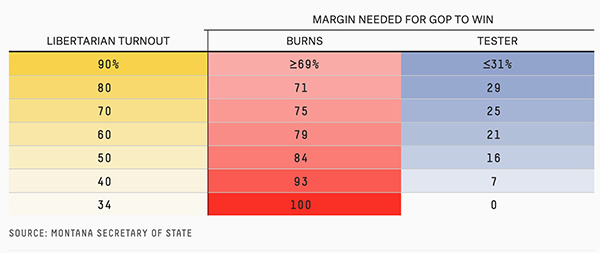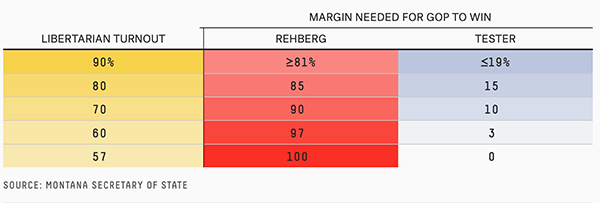

On Monday, we had an item about the Montana Senate race and how the Republican-controlled state legislature is working on a plan to replace partisan primaries with a top-two primary. The idea motivating the legislators is that by preventing the Libertarian Party candidate from appearing on the November ballot, Libertarian voters would be "forced" to vote for the Republican. We noted a possible problem with that plan is that if abortion is the big issue in 2024, some Libertarians will vote for the Democrat, Sen. Jon Tester (D-MT), because Libertarians are aligned with the Democrats on many of the culture-war issues (e.g., abortion, LGBTQ rights, and marijuana) because they think these are none of the government's business.
Over at FiveThirtyEight, Nathaniel Rakich has a different take on the proposed law, which doesn't conflict with our view, but adds another factor to consider. Rakich says that it is likely that some of the votes for the Libertarian weren't actually from Libertarians. They were protests votes meaning "none of the above." Nevada has an actual ballot line "None of the above," which typically gets 2% of the vote, but Montana does not. Rakich thinks that if the only choices were Tester and some Republican, some of the people who might otherwise vote for the LP candidate will simply stay home and not vote (or skip the Senate race). While not as good for the Democrats as an actual vote for Tester, that is better than a vote for the Republican.
Rakich backs up this analysis by looking at the 2006 and 2012 elections. Here are Tester's three Senate races.
| Year | Tester | Republican | Libertarian |
| 2006 | 49.16% | 48.29% | 2.55% |
| 2012 | 47.58% | 44.86% | 6.56% |
| 2018 | 50.33% | 46.67% | 2.88% |
In 2006, LP candidate Stan Jones got 2.55% of the vote. He didn't campaign on Libertarian principles. He campaigned on "a pox on both their houses." In other words, he actively courted people who hate both major parties, rather than people who believe in Libertarian principles. So there is good reason to believe that some of his voters would have stayed home rather than all voting for the Republican, Conrad Burns. What would have happened if some fraction of the LP voters stayed home? This table shows it:

So, for example, if only 90% of the LP voters actually voted, Burns would have needed to capture 69% of them to win. If only half the LP voters voted, Burns would have needed to capture a whopping 84% of them to win. That is very unlikely because the true Libertarians largely agree with the Democrats on the social issues, especially keeping the government out of everyone's bedroom. Burns would never have gotten 84% of the actual LP voters, so under these circumstances, Tester would still have won.
Now let's look at Tester's first reelection campaign, in 2012. This time he ran against Denny Rehberg (R) and Dan Cox (L). Cox did very well, getting 6.56% of the vote. Comparing the 2006 vote and the 2012 vote, it is clear that many of Cox' votes came out of Rehberg's hide. Now the same table as above.

Here, if 90% of the LP voters voted, Rehberg would have needed 81% of the rest of them to win. If 60% voted, Rehberg would have needed 97% of them to win. If half the LP voters voted and Rehberg got every single one of those votes, he would still have lost as he was too deep in the hole (2.90 points behind Tester). Half the LP voters wouldn't have been enough.
If 2018, Tester won an absolute majority, so even if every LP voter had switched to Matt Rosendale (R), that wouldn't have been enough.
We don't know what fraction of the LP voters will stay home if there is no LP candidate on the November ballot and we also don't know how many will vote for Tester, but the Republican assumption that they will all vote for the GOP candidate is probably not true. So while the proposed law probably doesn't help Tester, it may not hurt him as much as Republicans are hoping. And we haven't factored in the anger from LP voters who don't like this stunt and will vote for Tester just to make a point.
This stunt isn't the only one the Republicans are working on. Supreme Court justices in Montana are elected statewide. In 2021,Republicans tried and failed to elect them by district. This would give the legislature the opportunity to draw gerrymandered districts, something impossible with statewide elections. They did get something through in 2021, though. They changed the law to disallow a student ID card from a state university for the purposes of voting. This means that a college student who does not have a driver's license, official nondriver ID, a passport, or one of several other ID cards can't vote. Even in a deep red state like Montana, Republicans are scared silly that if everyone can vote, they are going to lose. (V)